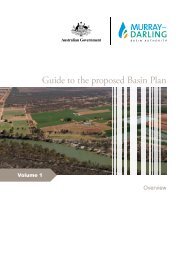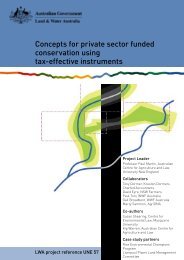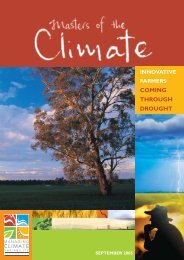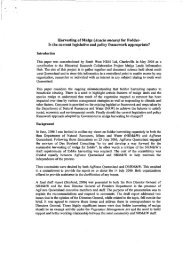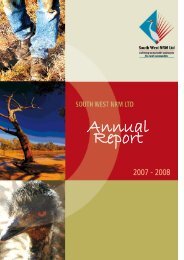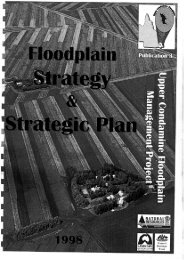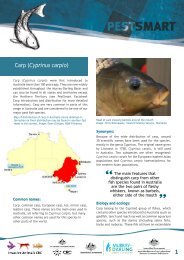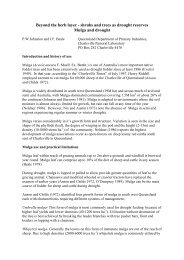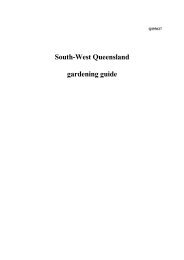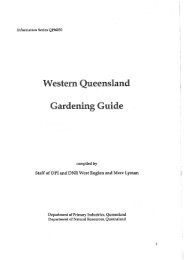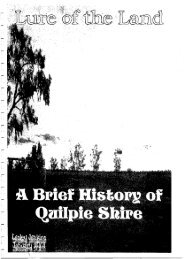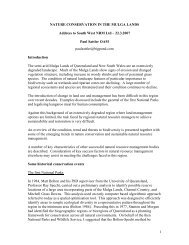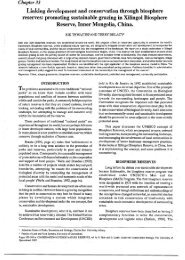soil-conservation-people-religion-and-land.pdf - South West NRM
soil-conservation-people-religion-and-land.pdf - South West NRM
soil-conservation-people-religion-and-land.pdf - South West NRM
Create successful ePaper yourself
Turn your PDF publications into a flip-book with our unique Google optimized e-Paper software.
"The university's job may not be the teaching or imparting of<br />
a particular set of values so much as helping students to see<br />
where values come from, how they are shaped <strong>and</strong> kept, <strong>and</strong> how<br />
they in turn shape actions <strong>and</strong> institution^^^.<br />
The most important contribution which ecological education can<br />
make is the development of what we may term the Ethic of<br />
Responsibility. Only in this way will the clash between<br />
private convenience <strong>and</strong> public welfare be resolved. The prime<br />
difficulty lies in persuading <strong>people</strong> to make sacrifices<br />
concerning their so-called st<strong>and</strong>ard of living, the size of<br />
their families <strong>and</strong> the cost of recycling wastes which, in<br />
turn, affects consumer prices.<br />
We might start with James Thurber's suggestion, that is: "Let<br />
us not look back in anger, nor forward in fear, but around in<br />
awarenessf1. I would add, "not with arrogance but with<br />
humility, not as though we were the last generation to inhabit<br />
the earth, but as temporary trustees of posterity's<br />
resource^^^.<br />
Conservation is essentially a concern for the human species.<br />
Ecological action, in the long run, can only be based on<br />
compassion, respect, underst<strong>and</strong>ing <strong>and</strong> a willingness to share<br />
with others. Not, "The l<strong>and</strong> belongs to us" but "We belong to<br />
the l<strong>and</strong>1'. Not "We are the conquerers of the eartht1 but Ifwe<br />
are a part of the earthly systemu.<br />
One of the greatest services which ecological education could<br />
render, would be the development of a clear underst<strong>and</strong>ing of<br />
the difference between sentiment <strong>and</strong> ethics. Sentiment is an<br />
unreliable guide; but ethics give us benchmarks, priorities,<br />
value judgements <strong>and</strong> accepted norms. Thus the starting point<br />
for ecological education is the development of realistic<br />
attitudes toward Man's treatment of his environment, <strong>and</strong> the<br />
end point of such an education is the cultivation of<br />
ecologically sound habits toward Nature. Between these points<br />
lies all the biological, physical, economic <strong>and</strong> social detail<br />
which gives an underst<strong>and</strong>ing of Man relative to his<br />
environment.<br />
In making a case for ecological education, may I plead for an<br />
end to the churning out of academic barbarians whose only<br />
ability is to analyse <strong>and</strong> pull apart. What we need is broadly<br />
trained synthesizers with perspective <strong>and</strong> balance, able to<br />
evaluate whole human situations. At the same time I would<br />
warn against our using the scarcity of precise information on<br />
environmental problems as an excuse for inaction.<br />
Ecology teaching is many things. It is showing a baby a<br />
beautiful flower, it is teaching a child to pick up papers, it<br />
is explaining the ecosystem to school pupils, it is studying



